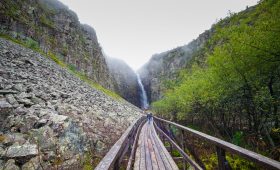Apollonia: A Journey Through Time in Libya
History and Culture
Apollonia, located in modern-day Libya, is a site rich in history. Founded by the Greeks in the 7th century BC, it later flourished as a Roman city. The city’s historical layers are fascinating, with early foundations now submerged underwater due to ancient earthquakes. Above these, the Byzantine period structures stand several meters higher, showcasing the city’s evolution over centuries.
Apollonia was once a vibrant cultural hub, known for its philosophers and artists. Although the philosopher Plotinus is not confirmed to have lived here, the city was undoubtedly a center of intellectual activity. Today, visitors can explore this rich heritage through archaeological sites and the Apollonia Museum, which houses artifacts from various periods of the city’s history.
Exploring Apollonia
Archaeological Sites
Start your exploration at the Apollonia Museum, where artifacts tell the story of the city’s past. The museum provides context for the ruins you’ll encounter, including the well-preserved Greek theatre dating back to the 3rd century BC. This theatre, located outside the old city walls, offers a glimpse into ancient entertainment and was later adapted for gladiatorial events during Roman times.
Don’t miss the Apollonia Archaeological Park, where you can wander among the remnants of ancient temples and marketplaces. The submerged ancient port, dating back to the 6th/7th century BC, is a unique feature, preserved underwater and offering a rare look at early maritime architecture.
Natural Beauty
Apollonia is not just about history; its coastal location on the Mediterranean Sea provides stunning natural vistas. The Cape of Apollonia is a particularly scenic spot, where the sea meets the sky, offering perfect opportunities for photography and quiet reflection.
Best Time to Visit
Visit Apollonia in spring or autumn for the most pleasant weather. Summers can be intensely hot, so if you choose to visit during this time, be prepared with sunscreen and plenty of water.
Getting There and Local Transportation
The nearest airport to Apollonia is in Benghazi, approximately a two-hour drive away. Renting a car is advisable for the flexibility it offers in exploring the area. Alternatively, taxis are available for those who prefer not to drive.
Summary
- Apollonia offers a deep dive into history with its Greek and Roman roots.
- Key sites include the Apollonia Museum, the Greek theatre, and the underwater ancient port.
- Enjoy the natural beauty of the Mediterranean coastline.
- Spring and autumn are the best times to visit for comfortable weather.
- Access is easiest via Benghazi, with car rentals or taxis available for local travel.




